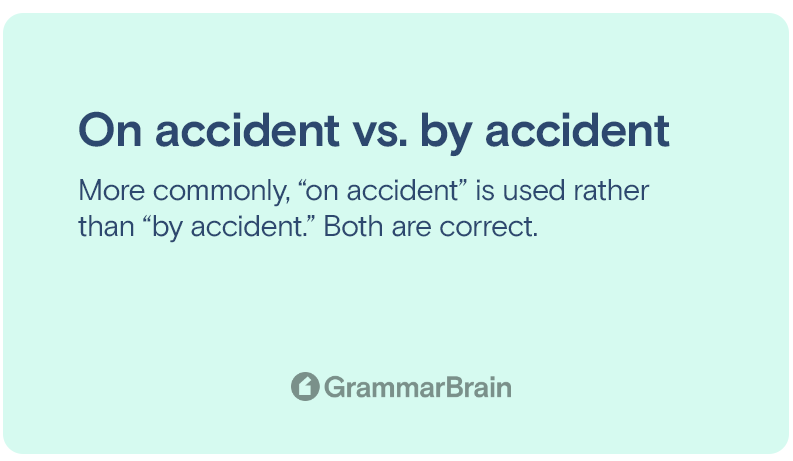Is it on accident or by accident? Adverb phrases that imply the very same thing as accidentally are on accident and by accident. One may say that they are not much more attractive than the simple adverb, however for the sake of variety, they can be intriguing in their own sense.
In this article, I shall contrast the phrases on accident and by accident. Each one of these phrases will be used in simple text to demonstrate their right context. In addition, I’ll show you how to employ a mnemonic method to make choices on accident or by accident a bit easier.
Which is more prevalent, “On Accident” or “By Accident?”
The customary phrase was coined by accident. It signifies without intent or as a result of coincidence rather than effort or desire. On accident is a variety that is nearly only seen in the United States. It has the same grammatical structure as the expression on purpose.
Something can be done on accident or by accident. Outside of that context, on accident is considerably less frequent than by accident, whereas the latter is nine times more prevalent. This includes incidents that occurred elsewhere than the United States.
This is among the expressions which native American English speakers typically use since it “sounds correct.” Or more particularly, because it is the language they have grown up hearing. It is ideal for non-natives to go with what is most acceptable, which is by accident.

When should one use “By Accident?”
What does “by accident” mean? By accident is an adverbial phrase. It is equivalent to the old adverb accidentally, meaning unintentionally. If you did not intend to spill a glass of water but did so nonetheless, you did so by accident. Similarly, if you burned your hand when lighting firecracker you did it by mistake, not intentionally. Below mentioned are a few examples of by accident:
- If I offended you, it was by accident; I would never intentionally be disrespectful to you.
- The waiter spilt the drinks all over the table by accident.
When should one use “On accident?”
On Accident is a synonym for the same adverbial phrase by accident. It might or might not be deemed a mistake, depending on person to person. Most style guidelines warn avoiding using on accident, and practically no one use on accident in formal writing.
Some attribute the disparities in usage to the era, claiming that old writers are more prone to use by accident, whereas youngsters are more prone to use on accident. People might use on accident in spoken English, but it is certainly not prevalent in written English. Almost no professional uses on accident formally.
There are 75 instances of by accident about every one usage of on accident. In other words, experienced editors and writers do not think of the phrase on accident is an acceptable alternative to the phrase by accident.
Conclusion
You can probably use whatever form seems most natural to you in spoken conversation, at least if you’re speaking to an American. However, the conventional variation of this phrase in formal writing is “by accident.” Finally, here is a mnemonic for you to remember which one you should use.
Because by precedes on in the alphabetic order, use by accident before you consider using on accident. In most cases, though, it may be a better choice to use the adverbial phrase accidentally instead of the other ones.
Inside this article
Fact checked:
Content is rigorously reviewed by a team of qualified and experienced fact checkers. Fact checkers review articles for factual accuracy, relevance, and timeliness. Learn more.
Core lessons
Glossary
- Abstract Noun
- Accusative Case
- Anecdote
- Antonym
- Active Sentence
- Adverb
- Adjective
- Allegory
- Alliteration
- Adjective Clause
- Adjective Phrase
- Ampersand
- Anastrophe
- Adverbial Clause
- Appositive Phrase
- Clause
- Compound Adjective
- Complex Sentence
- Compound Words
- Compound Predicate
- Common Noun
- Comparative Adjective
- Comparative and Superlative
- Compound Noun
- Compound Subject
- Compound Sentence
- Copular Verb
- Collective Noun
- Colloquialism
- Conciseness
- Consonance
- Conditional
- Concrete Noun
- Conjunction
- Conjugation
- Conditional Sentence
- Comma Splice
- Correlative Conjunction
- Coordinating Conjunction
- Coordinate Adjective
- Cumulative Adjective
- Dative Case
- Determiner
- Declarative Sentence
- Declarative Statement
- Direct Object Pronoun
- Direct Object
- Diction
- Diphthong
- Dangling Modifier
- Demonstrative Pronoun
- Demonstrative Adjective
- Direct Characterization
- Definite Article
- Doublespeak
- False Dilemma Fallacy
- Future Perfect Progressive
- Future Simple
- Future Perfect Continuous
- Future Perfect
- First Conditional
- Irregular Adjective
- Irregular Verb
- Imperative Sentence
- Indefinite Article
- Intransitive Verb
- Introductory Phrase
- Indefinite Pronoun
- Indirect Characterization
- Interrogative Sentence
- Intensive Pronoun
- Inanimate Object
- Indefinite Tense
- Infinitive Phrase
- Interjection
- Intensifier
- Infinitive
- Indicative Mood
- Participle
- Parallelism
- Prepositional Phrase
- Past Simple Tense
- Past Continuous Tense
- Past Perfect Tense
- Past Progressive Tense
- Present Simple Tense
- Present Perfect Tense
- Personal Pronoun
- Personification
- Persuasive Writing
- Parallel Structure
- Phrasal Verb
- Predicate Adjective
- Predicate Nominative
- Phonetic Language
- Plural Noun
- Punctuation
- Punctuation Marks
- Preposition
- Preposition of Place
- Parts of Speech
- Possessive Adjective
- Possessive Determiner
- Possessive Case
- Possessive Noun
- Proper Adjective
- Proper Noun
- Present Participle
- Prefix
- Predicate



